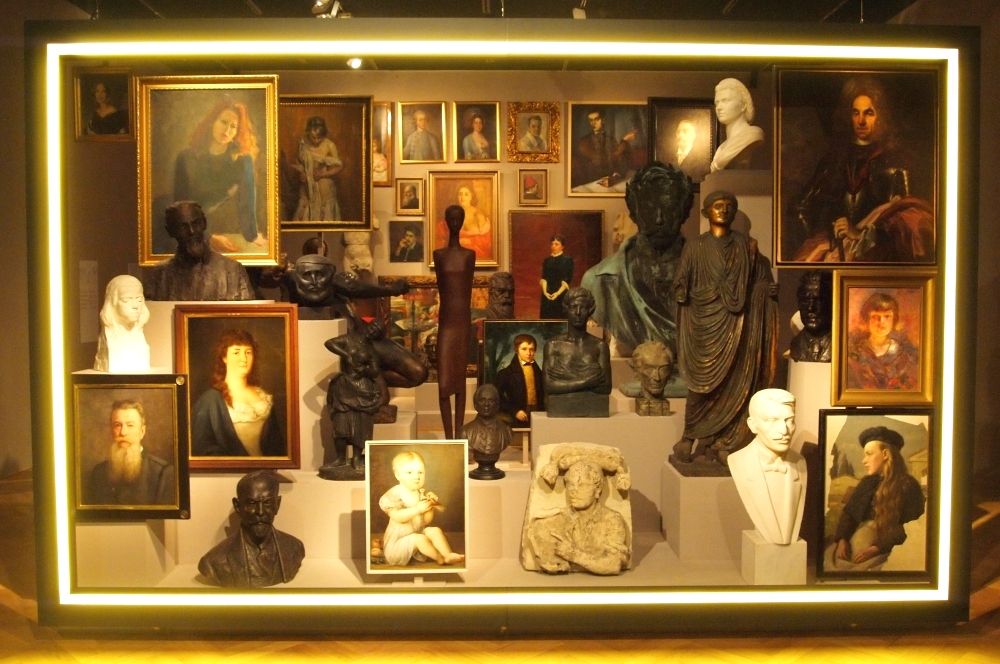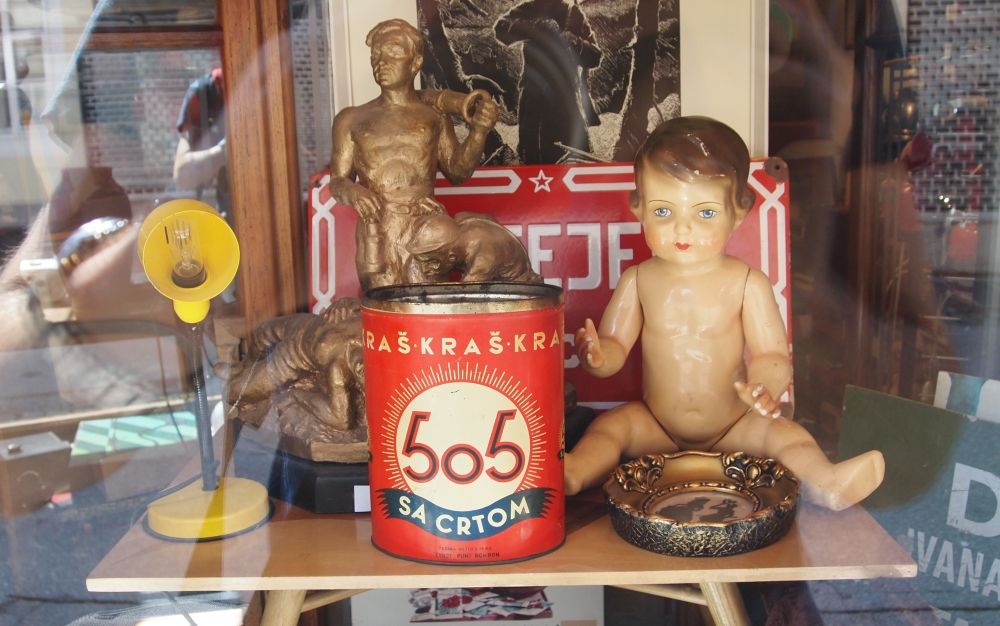News
The weather’s been great the last few days, with clear skies and relative warmth bringing a touch of Spring, and the tables outside café bars filling up with people enjoying the sun, the city and friends. While we’ll always make a case that you can get to know Ljubljana by just walking the streets and seeing what happens, which is how we mainly enjoy it, in truth that’s just half the story, if that, with the city’s museums, galleries, concert venues and so on providing a solid foundation to the quality time you can spend here. What follows is thus a selection of happenings and events over the next seven days, with the stand out, to these eyes, being the Mountain Film Festival. You can find out why it’s such a big deal here.
Something new we added this week was a write-up of the Balassi Institute, which brings Hungarian culture downtown with many free events. We’ll put these in the regular listings next time, but for now check out the events page here.
If you're not in town for the week of this guide (Feb 19 - 24, 2019) then you can see all the editions here, and you can enhance your stay in the city and impress or annoy friends and companions by learning some obscure facts about the city here, and the Castle here.
As ever, clicking on the venue names in the list below should get you more details with regard to the time, price and location, as well as other events on at this place in whatever week you're here. Finally, if there's something you want to promote in a future edition of What's on in Ljubljana please get in touch with me at flanner(at)total-slovenia-news.com
- Cinemas and films
- Clubbing
- Live music
- Opera, theatre and dance
- Harm reduction and drug testing
- Things to do with children
- LGBT+ Ljubljana
- Ljubljana Castle
- Museums and galleries
- Other things to do in Ljubljana
- Daytrips
- Getting around and other things
Cinemas and films
You can read about all the cinemas in town here, while a selection of what’s playing this week is below, and note that kid’s movies tend to be shown in dubbed versions, so do check before driving out to a multiplex and dropping off the young ones if they can't understand Slovene. Parents should also pay attention to Kinobalon, which is Kinodvor's regular weekend series of film screenings and events for children, from babies on up, with special parent/child events, "first time in a cinema" screenings, and babysitting. Learn more about it here, and see the current schedule here.
Kinodvor – The arts cinema not far from the train station is showing, among other features, Green Book, Beautiful Boy, Maria by Callas, Dogman, Cold War and If Beale Street Could Talk.
Kinoteka – This revival cinema isn’t far from Kinodvor, at the train station end of Miklošičeva, is having a mini Lars Von Trier season, including Nymphomania, parts 1 and 2, and The House that Jack Built, with viewer discretion advised for all three. There’s also Fish Tank and Paul Thomas Anderson’s outstanding There Will Be Blood.
Kolosej - The multiplex out at BTC City Mall is playing all the big movies, which this week include Papillion, Taksi bluz, a dubbed version of How to Train Your Dragon: The Hidden World, Green Book, Vice, Mary Queen of Scots, The Upside, Ralph Breaks the Internet: Wreck-It Ralph 2 (dubbed), The Grinch, A Star is Born, Bohemian Rhapsody, Escape Room, Lego Film 2, Cold Pursuit, Alita: Battle Angel (2D and 3D), Qu'est-ce qu'on a encore fait au bon Dieu? and Happy Death Day 2U. New this week are Berlin, I Love You, Beautiful Boy, Dumplin' (starts Tuesday), and Instant Family (starts Wednesday).
Komuna – The cinema in a basement behind Nama department store is showing Qu'est-ce qu'on a encore fait au bon Dieu?, How to Train Your Dragon: The Hidden World (dubbed), Beautiful Boy and Green Book.
Clubbing
Compared to some European capitals it can seem that nightlife in Ljubljana ends rather early, especially along the river, but there are still bars that stay open late and clubs were you can dance until dawn, and perhaps the best place to stumble across something interesting is the legendary Metelkova. Be aware it's a grungy kind of place and not for all tastes, but also that there's considerable variety to found within the various clubs there, from death metal to electropop, gay cabaret to art noise. You can read "the rules" of the place here.
Božidar - Friday there’s an all-nighter with Charlie Bones (Do You Records, NTS Radio / UK) b2b Illum Sphere (Ninja Tune, NTS / UK).
Channel Zero – Friday there’s also an all-nighter at this Metelkova-based venue, with DeepEnd! - winter showcase, presenting sound system music culture with Dub/Step/Grime/Jungle.
Gala Hala – Friday it’s Swaguljčica, with DJs Cookie, Toljo, Borka and White AF playing hip hop and trap. Saturday the beats turn to techno, with sets from DJs Deja Visitore and Shekuza.
Klub Cirkus – Monday the klub will be full of students from all the EU, with the Erasmus WELCOME PARTY / Biggest & Loudest. The next night it’s a part for all the students, with Poizpitni žur vseh fakultet, playing house, disco and party music. Things are then quiet until Friday, when it’s Crazy Cirkus ft. Clay Clemens, playing EDM. Then on Saturday it’s One Hit Wonder - Premiera! With tunes from the 80s until now.
Klub K4 – Now moving into it’s 4th decade, the klub for kool kids that’s not in Metelkova has drum’n’bass on Friday, with K4DNB w/ Pythius (NL) [Blackout]. Saturday brings Just A Dance, with DJs b2b2b, DEN7EL, Von Meister and Elovetric.
Koncertna Dvorana Rog – Saturday this venue at the dirty end of Trubarjeva, not far from the TSN squat, has Raggalution - Roots Rog Reggae Party (feat. Ras Levi), from 23:00 to 04:00
Orto Bar – Friday, 21;00 to 05:00, this rock-friendly venue will be putting down the guitars and picking up the turntables for a Super Mega 80s Party, with the sounds provided by the 80s Crew. Pictures of earlier events by this team suggest that low pressure, high pleasure times can be expected.
Live music
Božidar Thursday, 20:00 to 01:00, there’s Jazz Klub Mezzoforte with the Kostanjev Sekstet, followed Freestyle Karaoke & Jam Session. You can see the band playing on Cobblers’ Bridge below.
Cankerjev dom – Svetlana Makarovič is kind of a big deal, and has been for decades, and on Saturday evening you can see her on stage in a show called Instead Of Flowers, “a concert of original chansons”, with guests including Iztok Mlakar, Tomaž Mihelič Marlena, Andrej Rozman Roza, Ivan Rupnik, Janja Majzelj, Miha Bezeljak, Višnja Fičor, Ivan Peternelj, Anja Novak, and Martina Feri.
Cankerjev dom – Thursday and Friday, 19:30, Daniel Müller-Schott will be playing the violincello.
Channel Zero – Thursday, 21:00 to 0:00, it’s Level 15: Brom (RU) + Brgs: Free DBeat, with free jazz.
Gala Hala – Thursday you can enjoy stoner, garage, and alt rock Bring On The Vanguards.
Kino Šiška – On Monday evening you can learn more about “noise drone masters DIE! GOLDSTEIN and Kikiriki, who bring fresh socio-political content and contexts to music through an articulated personal approach. The authors spread a giant psychedelic mass through the vacuum of space, shaping it into an audio-visual journey.” Tuesday it’s the turn of German pianist, composer and producer Martin Kohlstedt, while the next evening you can see The Strange, with support from Malamor. The end of a packed week at this large venue that’s a short bus, bike or car ride from the centre brings the Amsterdam-based collective Altin Gün, who “will open the door into the unknown, into a blend of Turkish tradition, Western funk and psychedelic rock that places the stated expressions into a completely fresh context.” Check out all the headline acts below.
Klub Gromka – Tuesday night this Metelkova club presents the opportunity to enjoy grindcore and metal from a triple bill that includes Project for Bastards, Sedmina and Facial Tissue Dispenser. Thursday the event is FriForma, with Sugimoto, Dupleix, Bazelaire + Tomažin and Grom, and sadly I can’t seem to find any examples of their work. There are no such problems with Parnepar, the ex-Yugo post-punk bank who’ll be playing here on Friday.
Ljubljana Castle – Friday night is jazz night at the Castle, and this week it’s Milan Stanisavljević - "Weight of Thought".
Orto Bar – Kadilnica of Death are back with another metal event, this one with a triple bill of Morywa, Maskardh, and Morost (this last band sharing a name with my accountant).
Slovenska filharmonija – Sunday the choir of the Philharmonia will be performing at 19:30, with a programms that includes Gallus and di Lasso.
Opera, theatre and dance
Gledališče IGLU - IGLU Theatre – Saturday night this group is usually putting on an English improv show somewhere in town, but it’s generally promoted after this is written, so check the Facebook before putting on your shoes.
Mini Teater Ljubljana – The English schedule of varied performances for the month is here.
SNG Opera and Ballet – Tuesday Verdi’s La Traviata will be staged in this lovely theatre between Prešeren and Tivoli.
Pocket Teater Studio – Tuesday and Wednesday, 20:00, there’s a show of music and movement called Pod Voda (Under Water). Note that the number of seats in this small venue is very limited, and thus you should make a reservation via k.narobov@gmail.com.
Harm reduction and drug testing
Drogart is an organization that aims to minimise harm on the party scene, and offers drug-testing services and reports on their webpage. It’s in Slovene, but you can Google translate it or work things out yourself, and our story on the group is here. You can find the latest warnings on fake drugs and high strength pills and powders (in Slovene) here. However, be aware that all the usual drugs are illegal in Slovenia.
Things to do with children
You can find our Top 12 list of things to do with kids in Ljubljana here. If want to read more about the philosophy behind the wonderful House of Experiments look here, while our trip to the Museum of Illusions is documented here, and there’s always riverside walks, pizza and ice cream. With regard to the latter, take a look at our guide to six places that serve good ice cream in winter.
Mini Teater Ljubljana – The season sees a lot of puppet performances for children, in Slovene, at this theatre not far from Križanke. The English schedule for the month is here.
Ljubljana Puppet Theatre - The puppet theatre near the Central Market and next to the Castle funicular has a full programme or shows, for children and adults, with the schedule here.
LGBT+ Ljubljana
If you want to learn more about Ljubljana Pride, then take a look at our interview with its president here. If you're looking for more general links on "gay Slovenia", including a history of the scene and various projects, then you can find that here, while our stories about the community can be found here.
Klub Monokel – This lesbian bar in Metelkova is open every Friday, and is next to the open gay bar below.
Klub Tiffany – The gay bar next door is also open on Fridays, while every Monday until June 2019 there's tango at 18:00. On Thursday, 20:00 to 22:00, there’s a concert by the singer Tatjana Mihelj. Saturday there’s then Drag Trash – Out, which seems to be a drag-based lip sync party.
Pritličje – This seems to be the only "always open" LGBT-friendly cafe / bar / events space in town, and perhaps the country, so it's a good thing it's such a good one, open from morning to night, and with fliers and posters letting you know what's happening outside the narrow confines of, say, a general interest online what's on... guide.
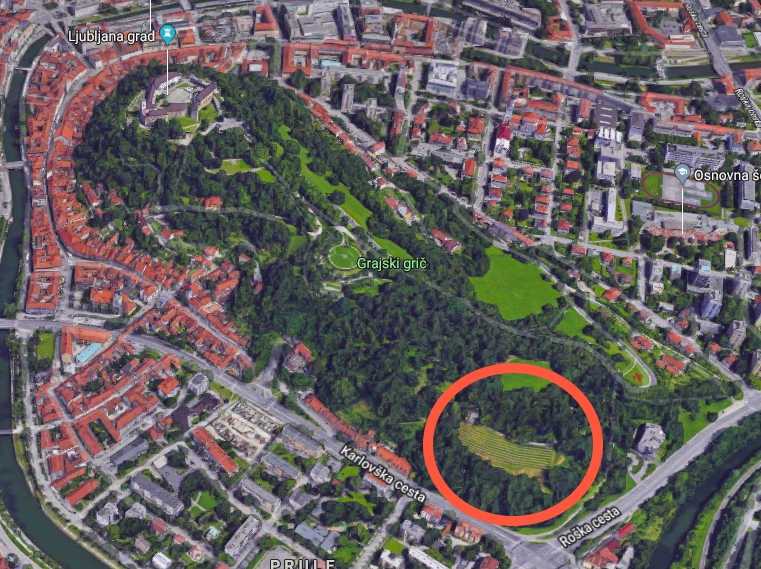
Screenshot from Google Maps, showing the location of the Castle vineyard
Ljubljana Castle
The city’s main attraction is said to be the top tourist draw in the country overall, and to my mind it earns a spot near the top just for the history and views. But beyond that the current owners, the City of Ljubljana, have laid out a varied, interesting and enjoyable programme of events, one that rewards regular revisits.
I try and get up there every Saturday morning to clear my head and move my feet on the trails, and never tire of that end of the hill. At the other end, where the Castle sits, there’s a lot more than fresh air on offer. There are guided tours, restaurants, a café, Castle museum, puppet museum, a Watchtower you can climb to the highest point in the city, art shows, dances, live music, movies under the stars, festival days and more – enough to reward multiple trips up the hill through the year. All of these activities and events can be found on the Castle website, while on TSN you can see “25 things to know about Ljubljana Castle” here, and “Ten Ways to Enjoy Ljubljana Castle” here.
Museums & Galleries
Most public galleries and museums are closed on Mondays, although not the National Museum, and - as noted at the start
Plečnik's desk. Photo: JL Flanner
Plečnik’s House is worth a visit if you want to learn more about the architect who gave Ljubljana much of its character. Read about our guided tour here.
Cankerjev dom – On until February 28 is the exhibition Ivan Cankar and Europe, Between Shakespeare and Kafka, while until March 10 there’s a photographic show on the Ljubljanica, with images of the city’s river captured by Bojan Velikonja. Showing until the end of March is a selection of specimens from The Newspaper Museum.
City Museum – The Museum in French Revolution Square also has an exhibition on the writer Ivan Cankar that’s on until the end of February 2019, with pictures, books and manuscripts, all presented in Slovene and English. It also has a very interesting permanent exhibition on the history of Ljubljana, from prehistoric times to the present day, with many artefacts, models and so on that bring the story alive.You can read about my visit here. Until March 2019 there's a show highlighting the work Elza Kastl Obereigner (1884-1973), a pioneer Slovenian sculptress, with an example of her work shown below.
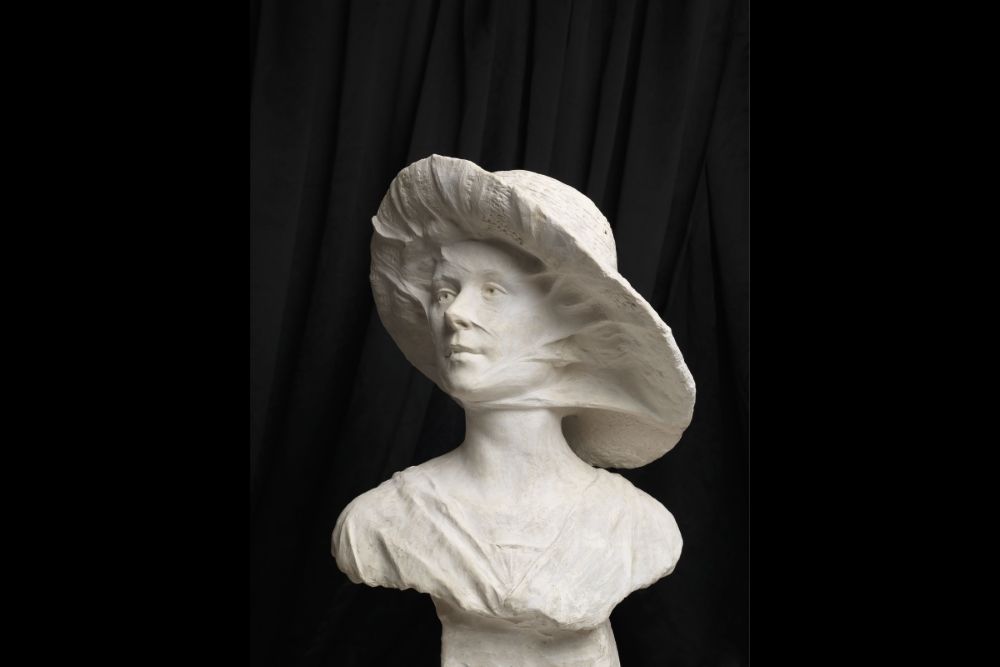
Photo: M Paternoster
The Faces of Ljubljana in the City Museum. Photo: JL Flanner
City Gallery - Not far from the Robba Fountain and running until March 24 is a show presenting drawings by Iztok Sitar, the original pages that were used to make his graphic novels over the last three decades. Rather adult in nature – think Robert Crumb in terms of sex, drugs and religion, in places – it’s free to enter and has much to enjoy. One of the pictures I took on my visit is below.
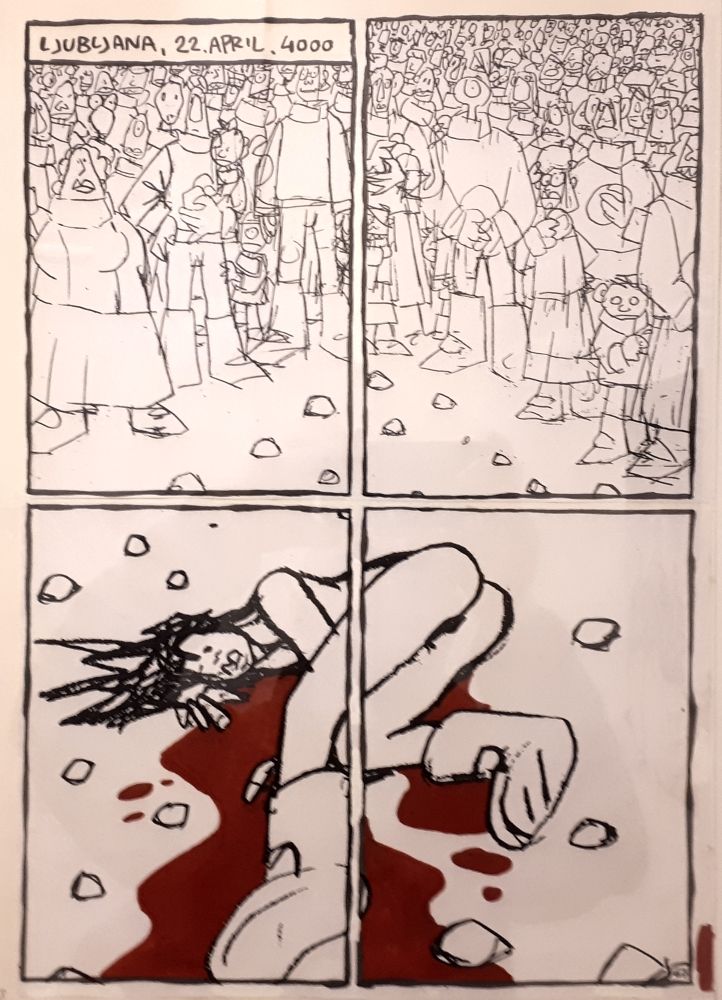
Photo: JL Flanner
Galerija Jakopič – On until March 3 is Over My Eyes (Na moje oči), an exhibition of photographs from Iraq taken by Iraqi photographers.
International Centre of Graphic Arts – Running from Friday until March 3 2019 there will be a show of posters from Milton Glaser, while paintings, drawings, prints and from Nathalie Du Pasquier in a show called Fair Game. The latter is being promoted with the following image.
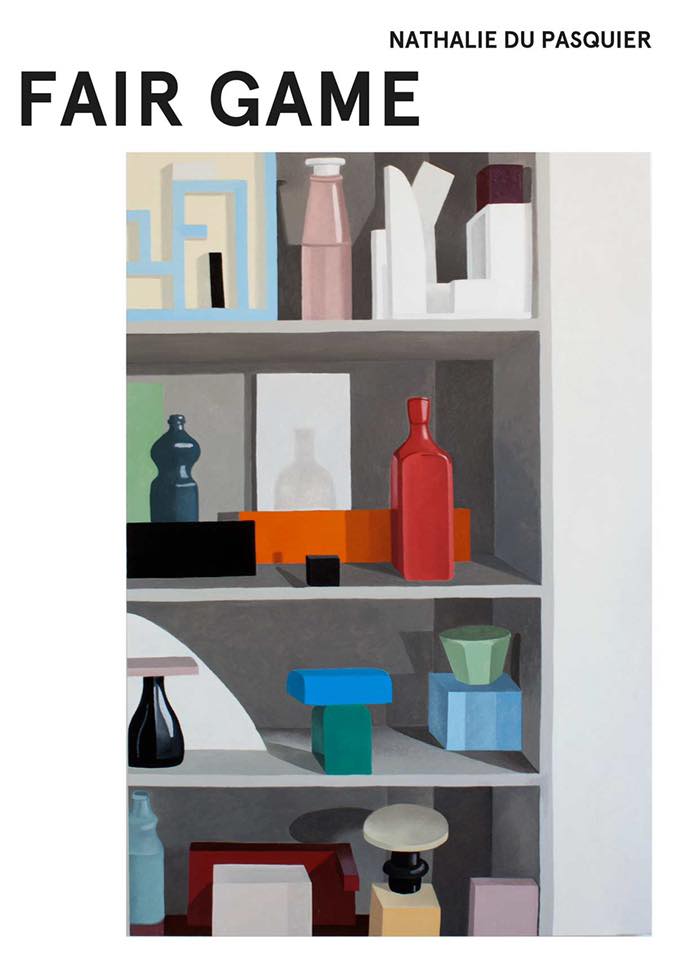
MAO – The Museum of Architecture and Design has much of what you'd expect, and until March 25, 2019, has a show on Ljubljana and it's relation with water. Until February 24 visitors can enjoy Toasted Furniture, which presents some experiments with the reuse of plastic waste, and until February 28 there's a show on Oskar Kogoj and his chairs.
Moderna galerija – The main branch of this gallery, to be found near the entrance to Tivoli Park, has a good collection of modern art, as well a nice café in the basement. Running until March 31 is a major show on young Slovenian painters, Time Without Innocence – Recent Painting in Slovenia, where you’ll see works like the following. You can read about my visit here (I loved it).
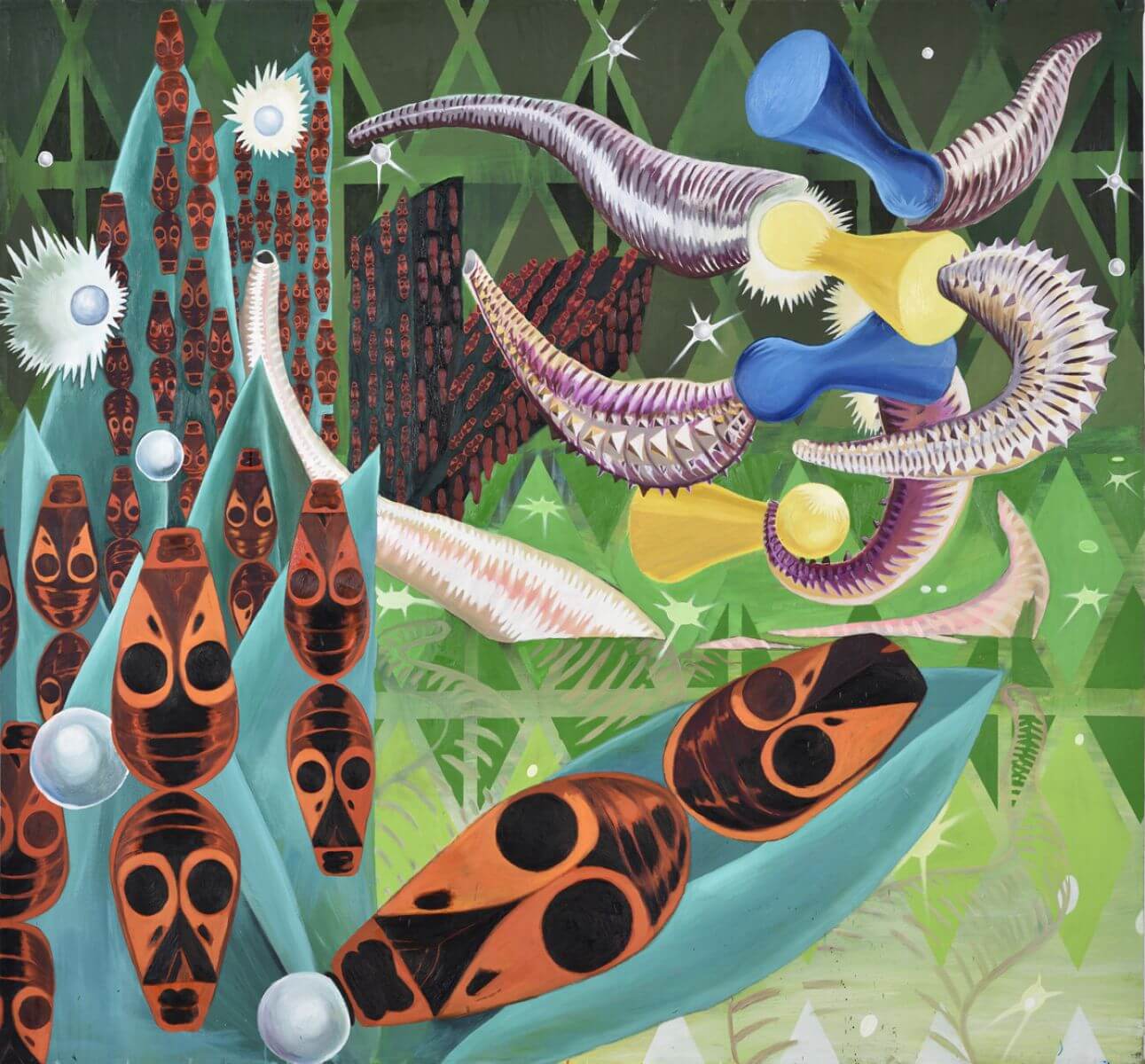
Iva Tratnik, Mating Season Totalitarianism, 2014, oil on canvas, 210 x 194 cm
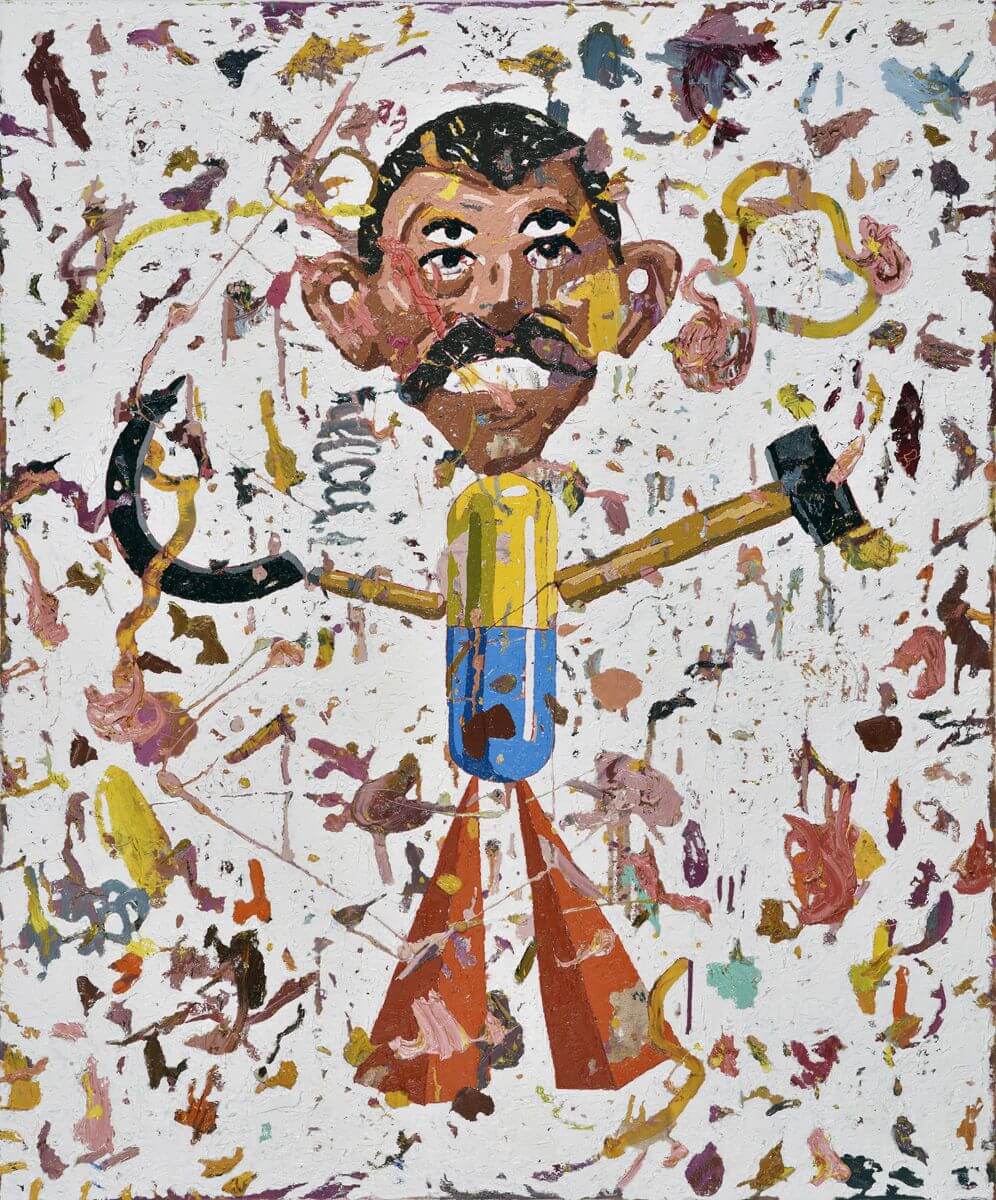
Arjan Pregl, from the Carnival series, oil on canvas (6 paintings 120 x 100 cm; 3 paintings 80 x 60 cm), 2018
National Gallery – The country’s main gallery has “the best” of what’s on offer from the Middle Ages to non-contemporary modern visual arts, and is in a great location for exploring other areas, just by Tivoli Park and opposite the main branch of the Moderna galerija. You can read about our visit to the room containing sacred art from the Middle Ages here.
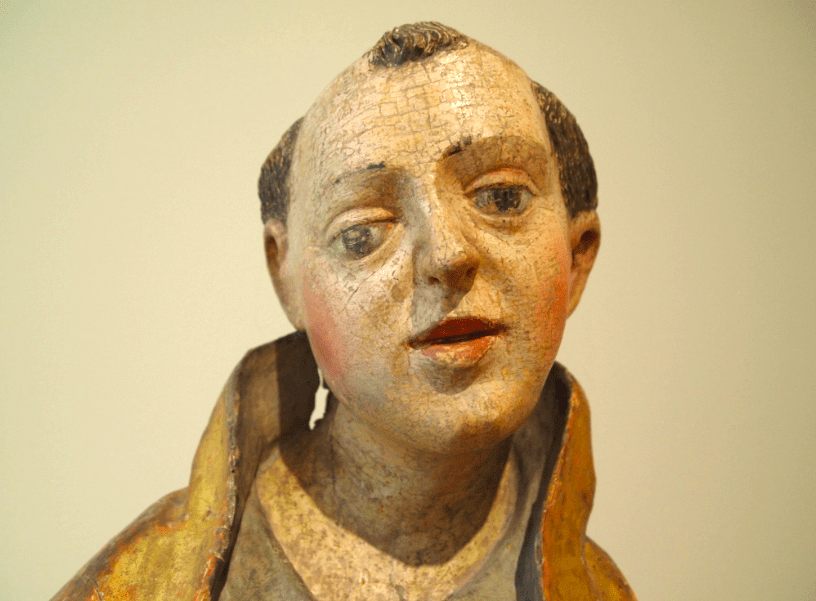
JL Flanner
The real Robba Fountain can be found in the entrance to the National Gallery - the one you see in the Old Town is a genuine fake, as seen below and reported here.
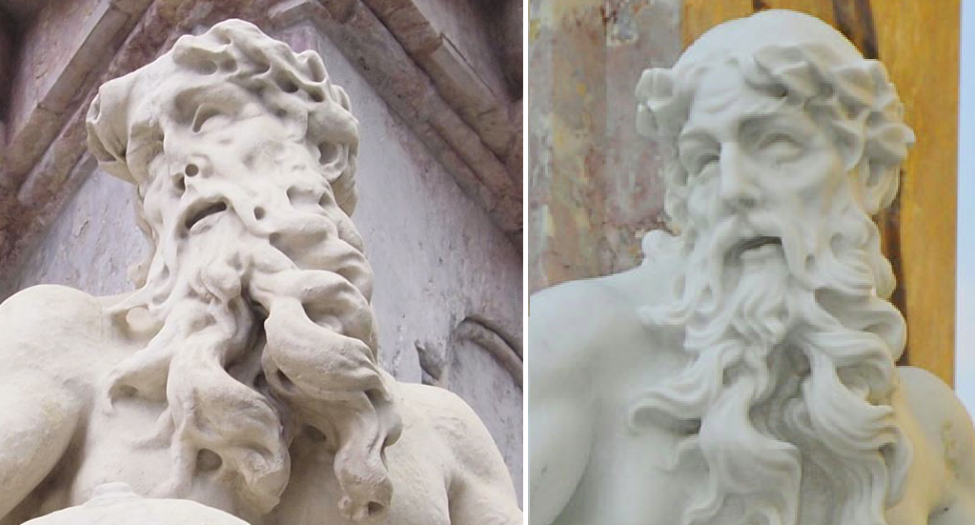
Photo: JL Flanner
National Museum of Slovenia – There’s plenty to see in the permanent collection here, from Roman times, Egypt and more, with the big draw this season being the exhibition of over 140 items of gold from Ming Dynasty China, as reported here, and with an example below. This runs until February 15th.
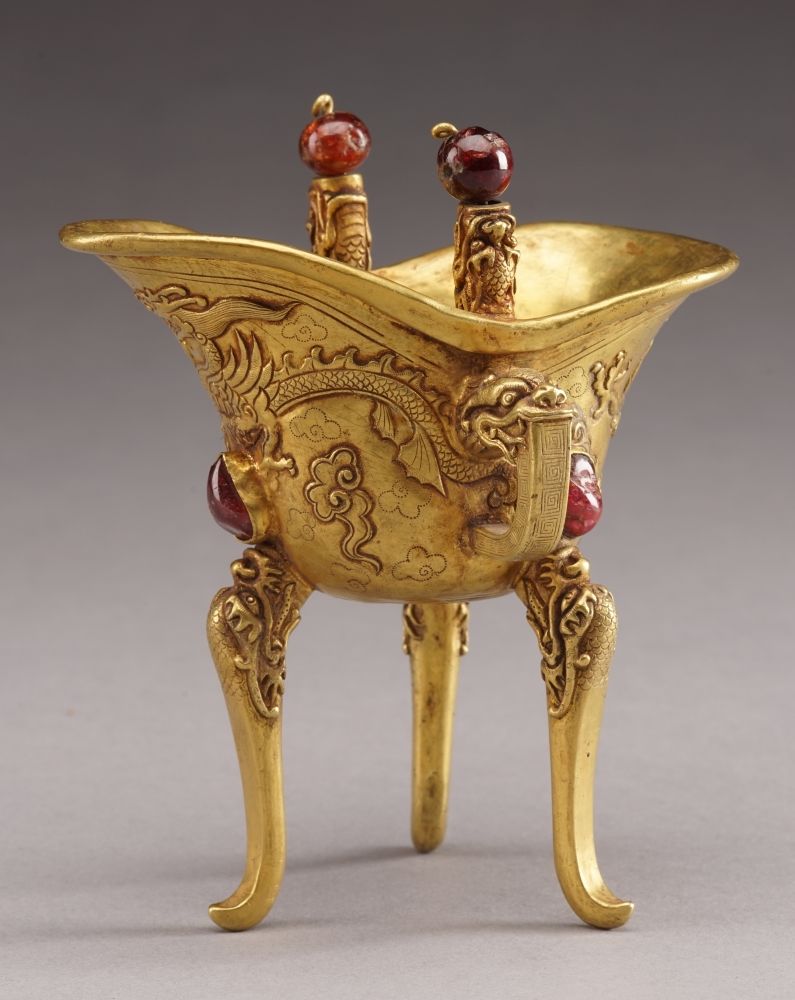
Photo: Wang Wei Chang
Meanwhile, the museum's Metelkova branch, located between one branch of the Moderna galerija and the Ethnographic Museum has some rooms on Church art, furniture and weapons, with the latter including more guns than you'll see anywhere else in town, and quite a thrill if coming from a nation where such objects are not household items.
Natural History Museum – On until the end of June 2019 is Our Little Big Sea, which takes a look at the oceans.
Slovene Ethnographic Museum – The museum currently has a temporary show on Bees and Beekeeping, on until June 16 2019, as well two permanent exhibitions. One of these is called Between Nature and Culture, and has a great collection of objects from Slovenia and around the world, well worth the trip up to the third floor to see it (as recounted here). This place is located near the newer branch of the Moderna galerija and Metelkova.
Union is "the Ljubljana beer", but now both it and Laško are owned by Heineken. There are many local brews on offer around town, though, if you want to explore IPAs, stouts, wheatbeers, sours and so on Photo: JL Flanner
Union Experience – The Ljubljana-based brewer has a museum showing the history of the company, with the ticket also including access to part of the factory and a few samples of the product. You can read about our visit here.
It's not a formal museum, but if you're interested in "Yugo-stalgia" then you'll enjoy a trip to Verba, a small, privately run space that's crammed with objects and pop culture items from the era, and is conveniently located at the start of one of the short walks to the castle. It's also a great place to take pictures, if you leave a donation, and you can read more about it here.
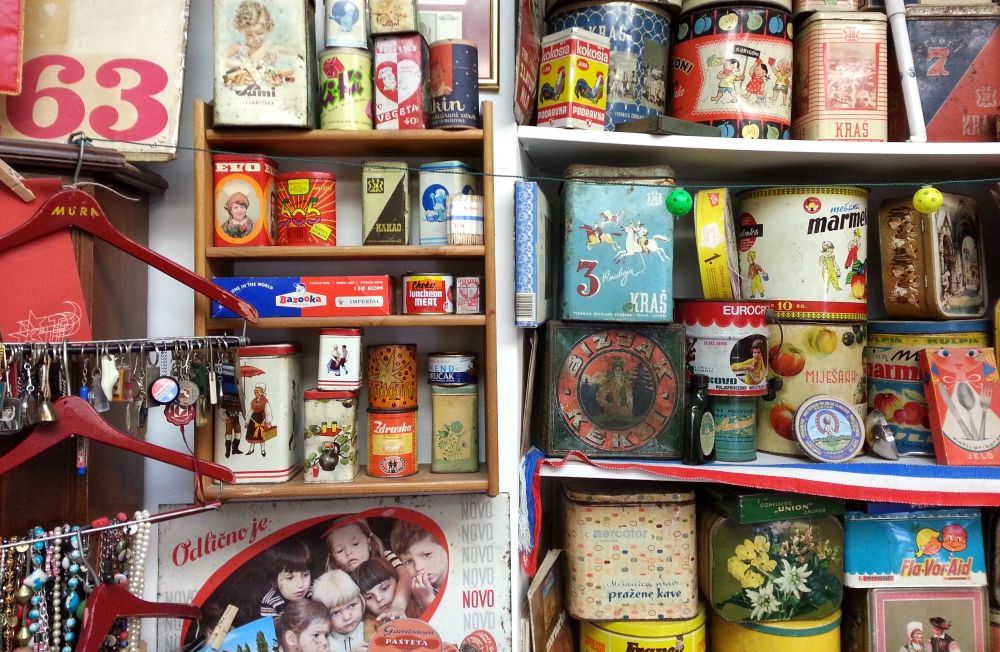
Verba. Photo: JL Flanner
Alternative Ljubljana isn't a museum or gallery, as such, but instead turns the city streets into a museum and gallery. Learn more about their tours of street art, history and LGBT Ljubljana here.
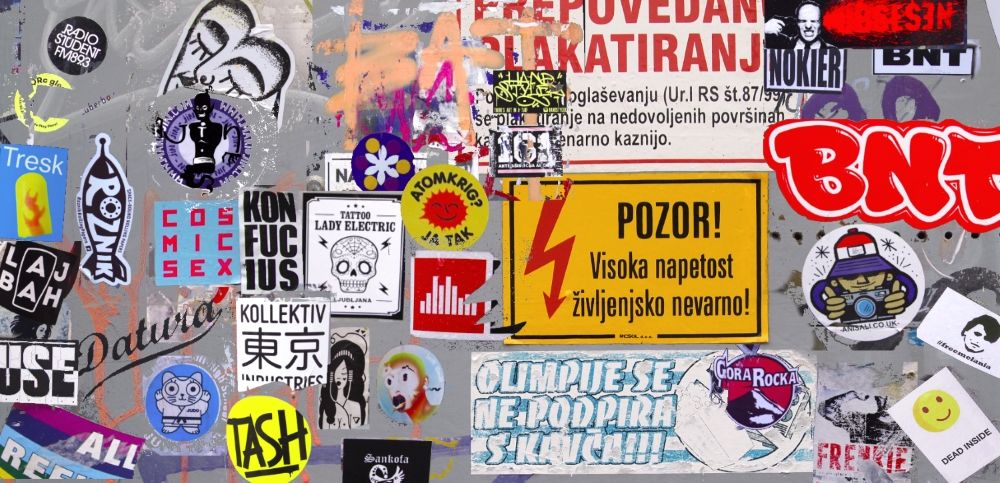
Photo: JL Flanner
Other things to do in Ljubljana
If you'd like to spend an evening painting with others, then take a look at Design with Wine, which organises painting parties on Trubarjeva cesta,
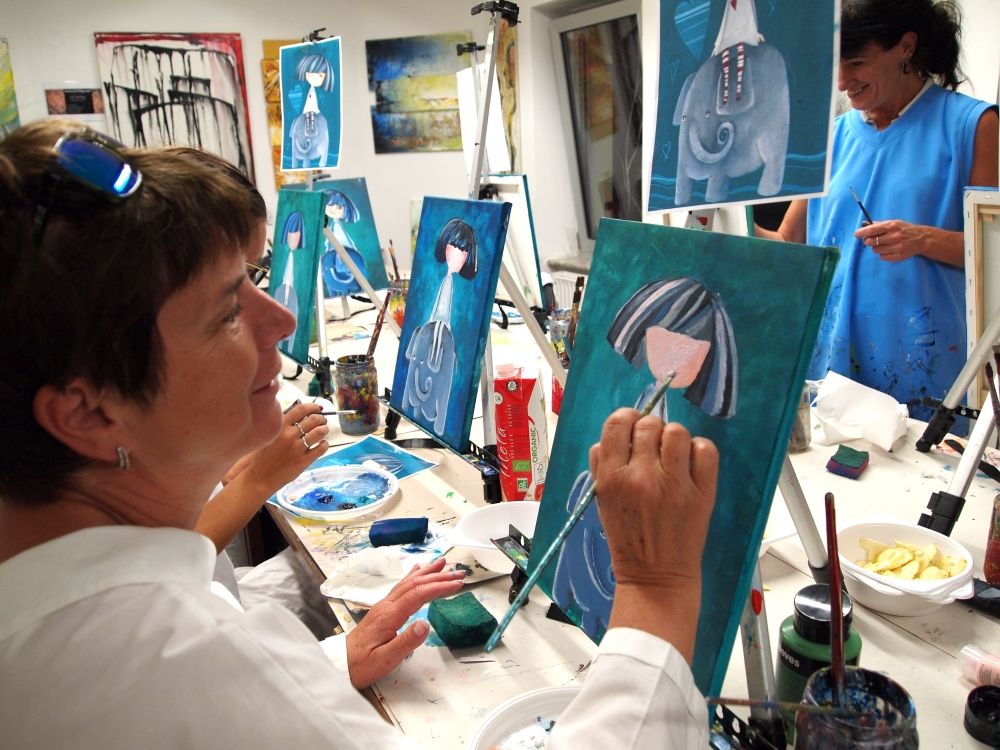
If you want to see some antiques, then check out the wonderful Antika Carniola, as discussed here. The man behind it, Jaka Prijatelj, has a fine eye for life on this street, as you can see on his Facebook account.
Photo: JL Flanner
If you’re in town and want to go jogging or walking in nature, why not take another look at the Castle, with a brief guide to the trails here. If you want something bigger, head to Tivoli Park.
And if you're bored with the Old Town, why not take a walk, cycle or boat ride to nearby Špica and enjoy the riverside life. Learn more about that here.
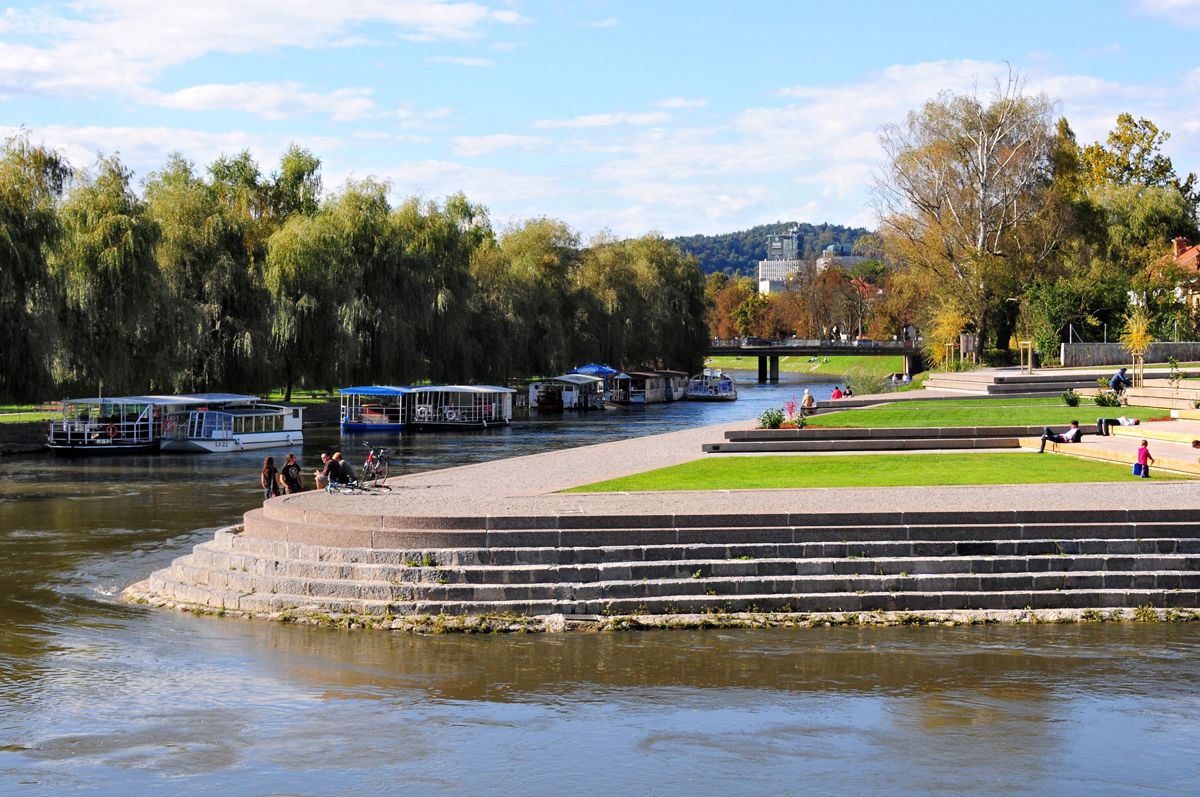
visitljubjana.si
![]()
maxpixel.net, public domain
Want to stretch and breath? Then check out our list of drop-in yoga classes for tourists, visitors and the uncommitted. If you're heading to the coast, check out our interview with a yoga teacher who offers breakfast sessions there, while if you're staying in town (or nearby) and want to try some "family yoga" then you can learn more about that here and maybe get your kids to calm down a moment or two.
There are some golf courses near Ljubljana, but even ones further away are not far, as seen in our list of all the golf courses in Slovenia. Note that these close when the snow starts, if it ever does this year, in which case you might be interested in what's new at Slovenia's ski resorts for 2019, as reported here.
![]()
Photo: maxpixel.net, public domain
Daytrips
Most of Slovenia is only a few hours from Ljubljana, and you can easily visit Lake Bled, Lipica Stud Farm, Postojna Cave, Predjama Castle, the coast and other locations, while if you'd like to take a photo of from that bench in Bled, then you can learn how to get there here. If you’re looking for something more ambitious, then check out our recent guide to the 17 members of the Association of Historical Towns of Slovenia
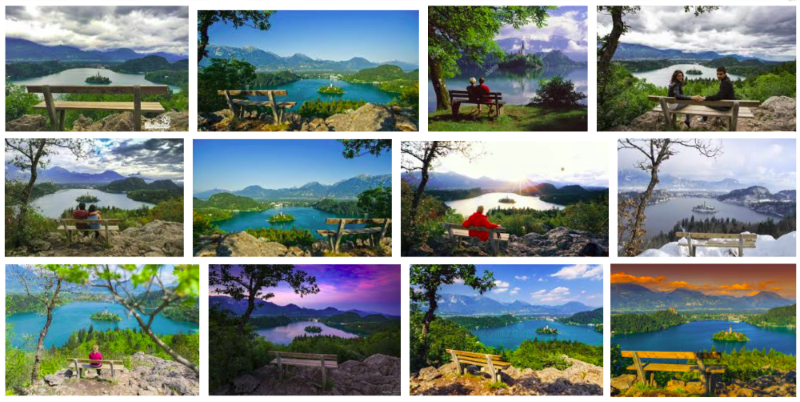
Photo: Google Image Search
Getting around
If you want to get a Ljubljana Tourist Card, which gives you travel on the city buses and entry to a lot of attractions, then you can read more about that here, and if you want to use the bike share system, as useful for visitors as it is for residents, then you can learn more by clicking this. Visitors with reduced mobility will be pleased to find that downtown Ljubljana is generally rated as good with regard to accessibility, and that there’s a free, city-sponsored app called Ljubljana by Wheelchair highlighting cafés, attractions and so on with ramps, disabled bathrooms and Eurokey facilities, which you can read about and download here. Manual wheelchair users can also borrow, for free, an attachment that will motorise their equipment, as reported here.
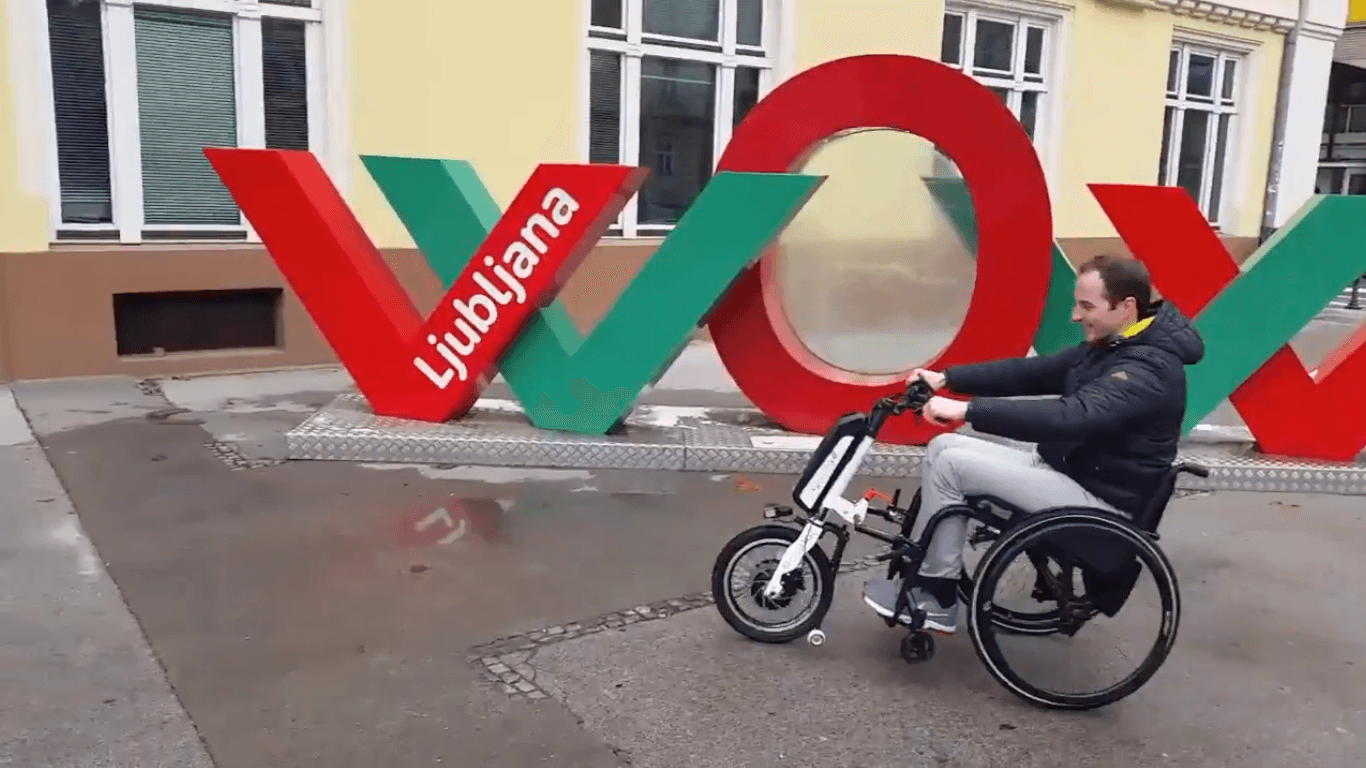
Screenshot from a Twitter video
If you’re driving into town and don’t know where to part, our guide to how to park in Ljubljana is here.
There aren't many places to eat after midnight, and most of them are by the train station, as reported here.
Want / need cigarettes but the stores have closed? Here's an incomplete list of bars downtown that will satisfy your craving for the demon weed. While if you’re having trouble with the ATMs then here’s a guide to the Slovene you’ll see on screen. If you get a hangover then find out where to get paracetamol (and prescription drugs) in Ljubljana here, while details on emergency birth control can be found here.
Ljubljana is a small and relatively safe city, but if need to contact the police then there’s a special number for foreigners, and that’s 113.
STA, 16 February 2019 - Prime Minister Marjan Šarec has criticised the conduct of senior Italian politicians in the aftermath of controversial statements made by European Parliament President Antonio Tajani and Italian Interior Minister Matteo Salvini last week, saying that historical revisionism was "completely misguided".
"This is reminiscent of Marshal [Pietro] Badoglio, who took over the government after Mussolini and succeeded in Italy hardly being recognised as a country in which Fascism was in power. Germany has gone through profound denazification, Italy has not had such a process," Šarec told Večer in an interview published on Saturday.
"As a Slovenian, I'm sensitive to falsification of history and in such cases things have to be said clearly. The Slovenian nation has never attacked anybody, it never had territorial designs, on the contrary, we lost a lot, which is why depictions of Slovenians as occupying forces need to be forcefully resisted," he said.
Šarec was among the first Slovenian officials to respond after Tajani and Salvini addressed a ceremony in Basovizza, Italy on Sunday marking the day of remembrance for Italian victims of post WWII-executions. He called the statements "unparalleled revisionism" and said Fascism's goal had been to destroy the Slovenian nation.
While Salvini has expressed surprise at Šarec's comments and reactions in Slovenia overall, Tajani issued several apologies, after his first comments were interpreted as a textbook example of a non-apology.
Šarec told the newspaper what Tajani had initially said was "not an apology. It sounded as if you called someone a complete idiot, they demand an apology, and you say: 'Sorry, you really aren't a complete idiot.' This is just saying the same thing differently."
In Slovenia disputes over postwar history are not rare and Šarec has faced his share of criticism for several speeches he has delivered at ceremonies commemorating the victims of WWII, but he says that he is "not the one bringing up history".
"I don't raise such issues, nor does the Marjan Šarec List, other politicians do it. But I will never not react to statements that do not belong in the 21st century. Polarisation is not good, we should learn from history by acknowledging what was wrong and celebrating what was good."
Slovenia not turning foreign policy towards the US
Asked whether Slovenia's support for Venezuelan opposition leader Juan Guaido "is a turn of Slovenian foreign policy towards the US", Šarec said it was not.
"It's not a turn in foreign policy. We always try to have good relations with all. We also don't have very close relations or too many visits with Russia."
He added he did not consider the support for Guaido as turning in the US direction "because we are Europeans".
"The whole EU has problems with the US policy of President Donald Trump," Šarec said, noting "twitter diplomacy does not suit us". As a small country, Slovenia must also pay attention to its own interests, he told the Maribor-based newspaper.
STA, 16 February 2019 - Slovenian snowboarder Žan Košir won the World Cup parallel giant slalom race in Pyeongchang, South Korea on Saturday, beating Austria's Lukas Mathies in the finals.
For the 34-year-old Olympic medallist this is the fifth World Cup victory, the first one coming in 2013 in Bad Gastein.
Košir is one of a few Slovenian athletes to boast three Olympic medals - bronze from Pyeongchang in 2018 and silver and bronze from Sochi in 2014.
Placing third in today's race was Austria's Andreas Prommegger.
Another Slovenian, Tim Mastnak, lost against Italy's Aaron March in the round of 16, to finish tenth.
The best Slovenian woman racer was Gloria Kotnik, who finished sixth.
Snowboarders will compete in another parallel giant slalom race in South Korea on Sunday.
STA, 14 February 2019 - The Postojna city council has decided to demand full closure of the Slovenian Armed Forces' main training area known as Poček, a vast area of forests and meadows in the south-west of the country. The municipality's official stance is now expected to be the basis for the Defence Ministry to decide on further steps.
Given the long-standing opposition to the army's training in the Poček area, the decision was largely expected. It came after Defence Minister Karl Erjavec asked the mayor in January to lay down the parameters acceptable for Poček to continue operations.
Erjavec said at the time that if the demands were such as to prevent Poček from remaining the main training area, the ministry would try to find other solutions.
The Poček military ground features an almost 2,000-hectare unpopulated area owned by the government and managed by the ministry since independence in 1991.
The wider area subject to restrictions when war games are under way comprises some 8,200 hectares, enabling the Slovenian Armed Forces (SAF) to train there and occasionally have international exercises and training with NATO parter countries.
It is no coincidence that Poček is the SAF's main training area as it was a military training ground before, used from the mid-1970s until 1991 by the Yugoslav army.
While Poček had been used as pastures for horses of the Vienna royal court from the early 18th century until 1915, Postojna, being a border area, was heavily militarised between 1915 when Italy declared war on the Austro-Hungarian empire and occupied the area, and WWII.
Since the area was in state ownership, it was relatively easy for the Yugoslav army to turn it into its training area, having purchased some more land from private owners in the 1970s.
But in 2000 the municipality held a consultative referendum at which Postojna locals decided on Poček's gradual closure.
Despite the people's will, Postojna and the ministry reached in 2004 an agreement on the military infrastructure in the area setting down their interests.
The accord, from which Postojna withdrew last December, set some limits on military activity, for instance a ban on shooting at weekends and on holidays, or limiting night shooting to ten days a month and until 11 PM from the beginning of June to the end of September.
But Mayor Igor Marentič says the army does not always stick to this. "Shooting is being carried out all months and at all times, regardless of tourism, and it is annoying even if it is announced in advance."
Water safety among major concerns
There are four things that bother locals: the noise coming from shooting and low flyovers, closure of air space (which affects the local airport), closure of the Poček area during exercises, and most notably water pollution.
Although locals could perhaps put up with occasional air space closures, pollution of the Malenščica water source for Postojna and Pivka would be a risk to public health.
While Marentič says the municipality has not commissioned any water monitoring or tests, the Karst Research Institute says its research has proved that waters from the Poček area travel underground towards the source of the Malenščica.
It adds that rain water in sensitive karst areas seeps underground very fast without having the opportunity to be cleaned, so it urges preventive measures.
Meanwhile, soil tests carried out by the ERICO institute in 2006 and 2009 showed "a strongly increased content of some heavy metals, primarily lead and copper", but its monitoring since 2016 has shown the heavy metals have not increased compared to previous measurements.
Also, Malenščica water monitoring by the Environment Agency, the ministry and the local water suppler have proved the concentrations were in line with drinking water standards.
The ministry has told the STA it is preparing a risk analysis to establish if certain military activity could have negative consequences for water quality in the area, while the municipality is drafting a bill to protect the water source.
Is a different solution still possible?
Erjavec indicated at his meeting with the mayor the army could go abroad for major war games and transfer some of its activity to other parts of Slovenia.
But pundits believe the attitude to Poček might be different if the SAF strictly respected the agreed rules and if the locals felt they benefited from it in some way.
Some foreign partners cannot understand the locals' opposition, but a well-placed source says "not a single job in this area is connected with Poček and the SAF does not get its supplies locally".
"If Poček is of national importance then the government could finance that, it would be only fair if the burden was shared by the local community and the state."
The ministry says it does not pay the municipality any compensation. However, on the basis of the 2004 accord, it co-funded local public infrastructure to the tune of EUR 3.1m and transferred property worth EUR 1.5m onto it in 2004-2018.
At the moment, the two sides are at odds over EUR 300,000 the ministry should pay for the new fire and rescue centre in Postojna, while it is also contesting the payment of EUR 1.3m in the duty for the use of land in Poček for 2013-2015.
Asked whether Postojna is opposed to Poček because it wants to develop into a green tourist destination, the mayor says this is not entirely so and stresses they have absolutely noting against the Slovenian army as such.
He notes, however, that while it is practically impossible to get an environmental permit for anything, "there are planes coming from other countries, shooting above this small tourist town".
"It's no longer appropriate to carry out such large-scale shooting with such heavy weapons only a kilometre in air line from the first settlements," he told the STA before the city council opted for closure.
Just yesterday, Defence Ministry State Secretary Klemen Grošelj told the parliamentary Defence Committee "intensive dialogue" was under way with the local community.
February 16, 2019
Delo reports that Barbara Šerbec, known as Šerbi, died yesterday at the age of 58, following years of diabetes-related health trouble.
Šerbi was a member of a 1980s group called Agropop. The group started at Radio Student as a bunch of city kids making fun of their country cousins, but ended being embraced at the both ends of the joke.
Delo once wrote that Agropop “perfectly combines cosmopolitanism with gardening in the most beautiful country on the sunny side of the Alps. Their importance for Slovenia’s independence is as great as the importance of Pankrti and Laibach. If Pankrti undermined the Party and Laibach undermined the State, then Agropop did that to the nation. These groups did not just mock their targets, but identified with them from a distance.”
STA, 15 February 2019 - Revenue from foreign tourists visiting Slovenia reached EUR 2.71bn in 2018, up almost 12% from 2017, data from the central bank show.
The figure is around a billion euro short of the target set for 2021, the Slovenian Tourist Board said on Friday as it commented on Banka Slovenije's figure.
Data also shows that in December alone, revenue from tourism increased by a good 10%.
With more than 5.6 million tourist arrivals and almost 15.3 million nights, 2018 was the fifth consecutive record year for Slovenian tourism, early Statistics Office data shows.
The key goal of the country's 2017-2021 strategy on sustainable development of tourism is raising revenue from foreign tourists to EUR 3.7-4bn.
The goal for tourist arrivals is five to 5.5 million, with nights projected to rise to 16-18 million.
In 2018 SILA – or SILA-IWCL, International Women’s Club Ljubljana, to give the full name – celebrated 25 years as a focal point for foreign women in Slovenia, as well as Slovenians who want to connect with the international community. But in doing so the group looked to the future more than the past, with the social changes that have taken place over the last quarter century increasingly reflected under the leadership of Marta Helena Berglez, along with greater engagement with a wider and more diverse community.
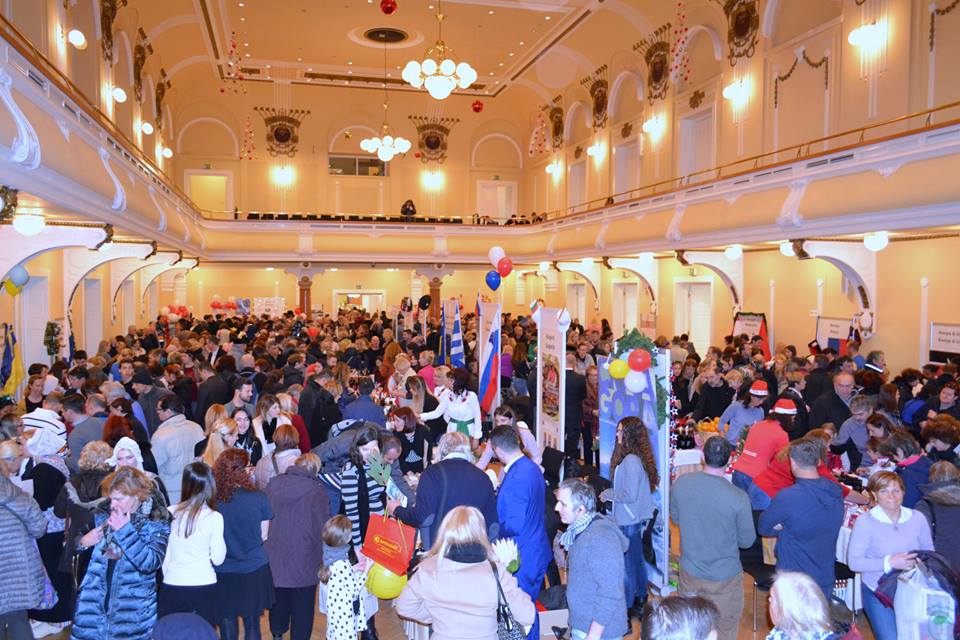
The annual bazaar
While SILA started as an association for the wives of diplomats and businessmen, who needed something to keep them busy while stationed abroad, it’s now shaken off the old image and is open to any and all women, no matter what their marital or professional status, Slovenes included.
As noted in an earlier article, SILA organises a broad range of events and activities for its members – cultural, sporting, educational and more – with the aim of bringing people together and making new connections, with each other and with Slovenia.
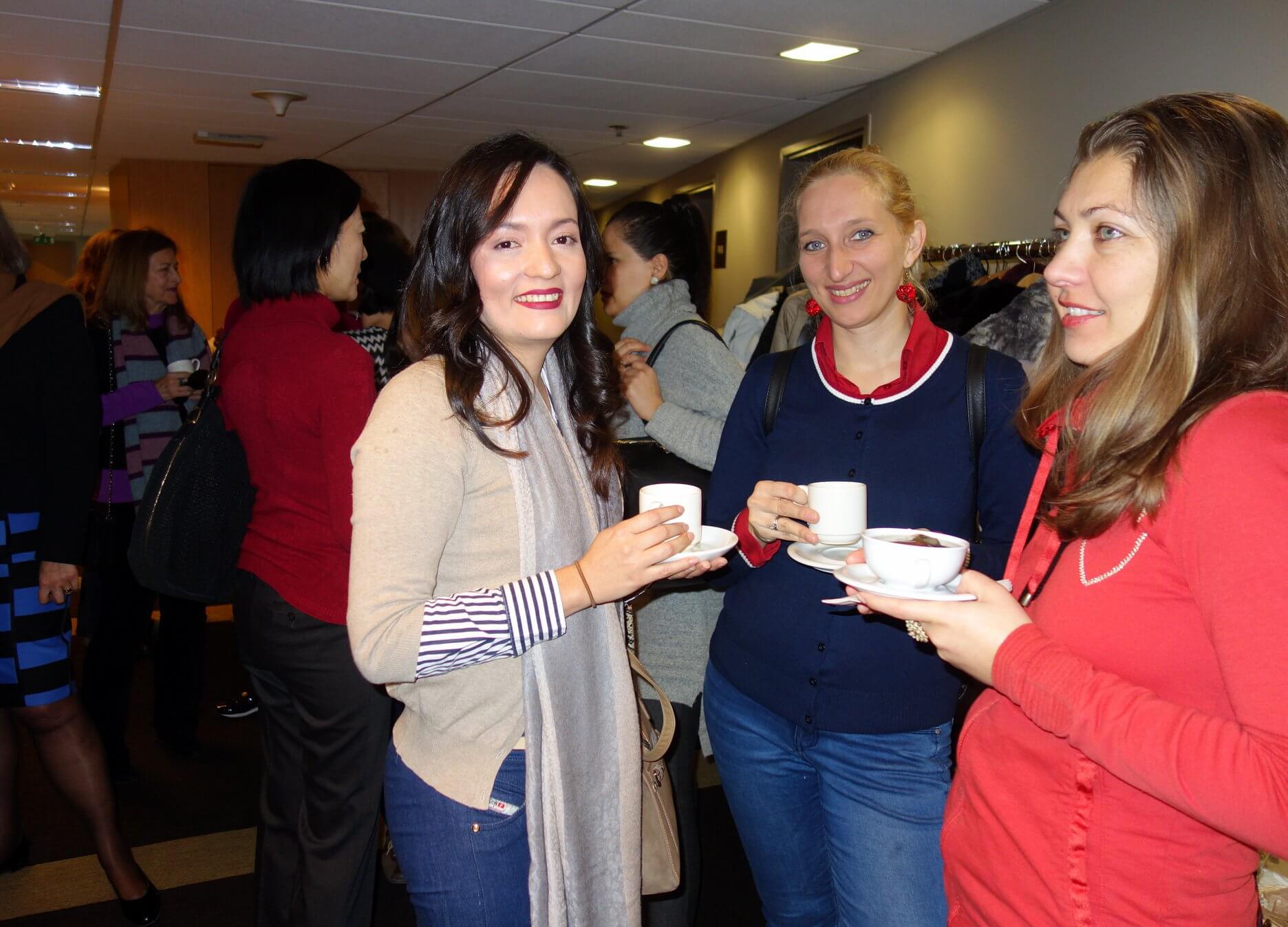
An important aspect of the latter is SILA’s charity work. This finds its greatest public expression in the annual bazaar, held each December in the ballroom of the Grand Hotel Union, but this year there’s a new event in the schedule, the Spring Soirée. This will be held on Saturday, March 30, and will present an evening of food, drink, music and dancing in diverse company, drawn together out of curiosity and all for the benefit of Europa Donna. This is an independent, Europe-wide organisation that represents the interests of women regarding breast cancer to local and national authorities, as well as to institutions of the European Union. The current vice-president of the group is Tanja Spanic, a Slovenian cancer survivor who will be one of the speakers at the evening, which aims to raise money from ticket sales (€55 each) and donations.
If you’d like to learn more and perhaps buy a ticket to Spring Soirée, or if you work for a company that might be interested in sponsoring a table and making a presentation to the guests, then you can learn more here.
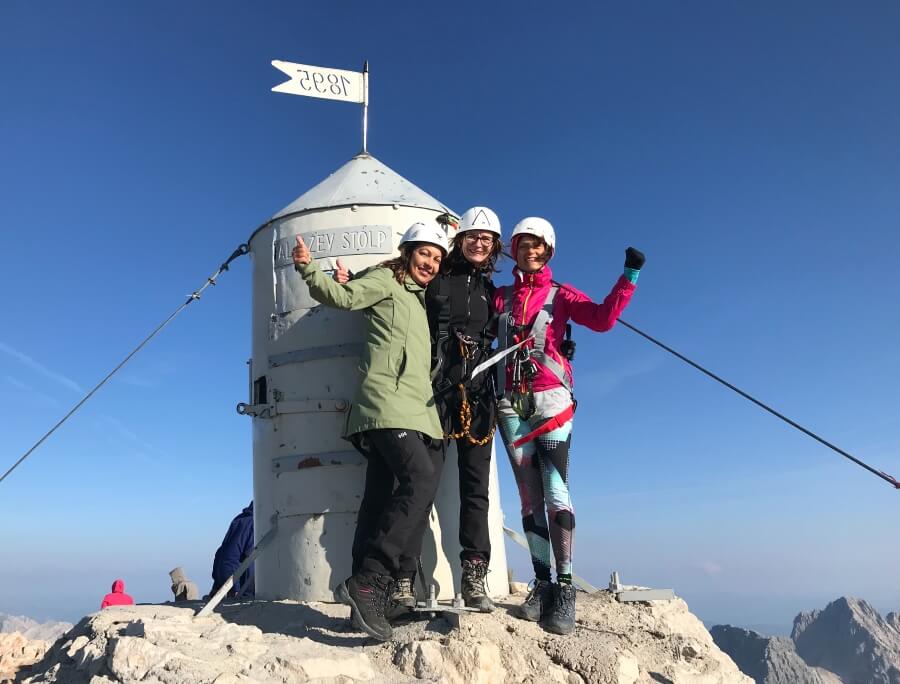
If you can’t make it on March 30 then don’t worry. A good way to keep up with SILA and its activities is to follow the group on Facebook or visit its new webpage, while the best way is to join and start meeting new people and doing new things, opening up a world of opportunities in Slovenia, both personal and professional.
The covers and editorials from leading weeklies of the Left and Right for the work-week ending Friday, February 15, 2019
Mladina: EU election campaign to be dominated by fierce rhetoric
STA, 15 February 2019 - The magazine Mladina says the coming EU elections will be a clash, yet not a clash for a united Europe but a clash within Europe, of one nation against the other, as it comments on European Parliament President Antonio Tajani's recent revisionist statements at a foibe commemoration in Italy.
Editor-in-chief Grega Repovž says in Friday's editorial that superpowers America, Russia and China will also get involved because a weak EU is in their interest.
"These elections will be much more ground-breaking than we have hoped," Mladina says under the headline Tajani, Just a True European.
"We can he grateful to Antonio Tajani for his speech at Basovizza, since the majority of people has overlooked the fact that with a few exceptions, most European parties have started resorting to nationalist rhetoric over the past four years."
Nationalist populism has become s staple of political success in the West, even moderate politicians use it for fear of being accused no not being patriotic enough.
"This is of course a way to hell, but also the European political reality," says Repovž, recalling that in fear of losing the race against nationalists, some have gone as far as erecting razor wire on the border during the recent migration crisis.
Just before the elections to the European Parliament, Tajani showed very clearly that the election campaign will be pervaded by nationalist rhetoric. "Nobody will dare avoid it in order not to fall behind."
It adds that Tajani is no radical extremist, but a calculating politician with short-term goals in his mind who also has to adjust to the rhetoric of Italian Interior Minister Matteo Salvini which dominates Italy.
But his statements also show he apparently cares little about Europe currently being a fragile institution with an uncertain future where it can easily happen that European institutions themselves start using nationalist populism.
"Let us not be fooled by his apology," Repovž says, noting Tajani did not think his words would resound from a small village on the far east of Italy all the way to Brussels.
Demokracija: Vouchers could revitalise Slovenian culture and bring it closer to the people
STA, 14 February 2019 - The right-wing weekly Demokracija disputes the quality of Slovenian arts in response to the Culture Day ceremony address by Vinko Möderndorfer, the chairman of the Prešeren Fund board. It argues Slovenia should introduce a voucher system as proposed by James Heilbrun and Charles M. Gray in The Economics of Art and Culture.
"In his speech, Möderndorfer degraded and insulted Slovenians and Slovenia as few before him in a long while ... The recurring theme was the same: badmouthing the state over its stepmotherly attitude to culture despite an extra 30 million euro for culture in this year's budget.
"But it is not enough. It is never enough. Even if the Culture Ministry's budget increased by 100 or 200 million euro, they would still demand an increase in public spending; most on their own behalf," editor-in-chief Jože Biščak writes.
He agrees that Slovenian culture is in the doldrums. However, he says the reason is not underfunding but rather that "a bunch of people, self-styled artists have learnt that they can get money without trying at least a bit to justify it and satisfy the needs of culture consumers".
"Their works, whatever they are, are mostly an aim in itself, no one ever even thinks of fighting for the reader, viewer or buyer. Also because the taxpayers are forced to pay for something they are not interested in even in their nightmare," Biščak writes, offering Möderndorfer's latest film as a case in point.
He says that the only cure is market economy, but he also offers vouchers as a compromise that would suit those who believe culture should be financed from public funds and those who favour market logic.
He proposes that the roughly EUR 380m or EUR 190 per capita that is allocated for culture from the national and local budgets should be distributed among Slovenia's citizens so that everyone gets a EUR 190 voucher a year to spend it on culture of their own choice. The artists who get the vouchers would then exchange them for money from the budget.
All our posts in this series can be found here
STA, 15 February 2019 - Slovenia's European Commissioner Violeta Bulc has invited European Parliament President Antonio Tajani to join her in paying respect to Slovenian victims of fascist and Nazi violence by visiting the former Nazi concentration camp Risiera in Trieste and the nearby village of Basovizza.
Transport Commissioner Violeta Bulc issued the invitation in a letter after a Twitter exchange with Tajani in the wake of his recent contentious speech at a commemoration of Italian victims of WWII aftermath events.
While Tajani said "I'm ready" as the proposal was made by Bulc in the 11 February Twitter exchange in which the commissioner accused him of distorting historical facts, he has not yet responded to the letter.
All our stories about Facism in relations to Slovenia can be found here
Bulc is proposing they jointly lay wreaths at Risiera and at a memorial near the village of Basovizza to honour the deaths of three Slovenian and a Croatian anti-fascists at the hands of Italian soldiers in 1930. They are considered the first victims of fascism in Europe.
It was Basovizza where Tajani remembered the Italian victims of post-war executions and Italian exiles from the regions of Istria and Dalmatia last Sunday, calling out "Long live Trieste, long live the Italian Istria, long live the Italian Dalmatia" in the process. He has since apologised for these words.
In the letter, Bulc welcomes Tajani's willingness to accompany her and proposes that the gesture be made on "25 April to commemorate Italy's Liberation Day".
"In these challenging times for the EU it is more important than ever before to promote the EU as project for peace, solidarity and unity and as bringing prosperity to all our nations," Bulc wrote in the letter, which she also published on Twitter.
"History teaches us that aggressive nationalism can easily be misused for nationalistic conflicts and even fuel war. I believe that society is today ready to build its future on cooperation and respect for one another."
STA, 15 February 2019 - The European Investment Bank (EIB) has placed the project to build a new railway line between the port of Koper and Divača among the projects it would finance with loans. The state-owned company managing the project said that the EIB would provide a EUR 250m loan.
Announcing the news, 2TDK said that it had submitted the application for a EUR 250m loan to the bank last May.
"Negotiations between the EIB and 2TDK followed between October and January, on whose basis the investment bank will make a final assessment of the project and expectedly send it for confirmation by the board of governors in April."
Infrastructure Minister Alenka Bratušek, whose ministry is responsible for the project, welcomed the news, saying that the bank had recognised the quality and importance of the project.
"I'm happy that the things are moving in the right direction," the ministry quoted Bratušek, who added that the lengthy negotiations with the EIB had obviously produced a positive result.
"The decision is not final yet, but the placement on the EIB list means that the bank too has recognised the quality and importance of this project, which I believed in and expected throughout," the minister added.
In addition to government funding, the investment plan for the project also envisages loans from international financial institutions and the state-owned SID export and development bank, EU grants and loans from commercial banks.
The plan values the project at EUR 968m at current prices, but together with a reserve for unexpected works and interest the total price tag will be EUR 1.2bn.
All our stories on railways in Slovenia can be found here
The railway will be only 27 kilometres long, but the huge cost is attributed to the high number of tunnels and bridges on the tricky karst terrain.
Good news for the project also came today from the National Review Commission, which rejected a request for the suspension of public contracting pending an audit of the public tender for the project dossier.
The audit and the suspension of the public tender process was demanded by the engineering company Geoportal at the end of last year.
The review commission is yet to decide Geoportal's request to annul the tender. 2TDK had already rejected the request before forwarding it to the National Review Commission.
The sole bid for the job, worth EUR 19.93m excluding VAT, was submitted by a consortium of companies consisting of Elea iC, SŽ-Projektivno Podjetje and IRGO Consulting.
STA, 14 February 2019 - Andrej Šiško, the self-styled leader of a paramilitary unit whose footage stirred Slovenia in mid-2018, pleaded not guilty to inciting to violent subversion of the constitutional order at a pre-trial arraignment held in Maribor on Thursday.
Šiško, who was apprehended last September after a video surfaced of a para-military group parading in the woods of north-eastern Slovenia, argued he was the only one in Slovenia who had actively called for the preservation of the constitution.
The 49-year-old former ultras leader announced he would present the reasons for his provocation during the trial, to start on 6 March.
All our articles on this story can be found here
Šiško, who had also called for the formation of other militias around the country and uttered a threat against then Prime Minister Miro Cerar in January 2017, is to be tried together with the man allegedly responsible for the footage, Matej Lesjak. The latter also pleaded not guilty.
The defendants' lawyers requested today that President Borut Pahor, Prime Minister Marjan Šarec, Cerar as well opposition leader Janez Janša appear for testimony during the trial.
Šiško's lawyer Lucija Ušaj argued Pahor, as commander in chief, could explain if Slovenia's Armed Forces could really be defeated by a "sports club whose members use airsoft guns", Cerar could say how threatened he really felt, while Janša could speak about his past proposals to form a national guard.
As to Šarec, the defence claim that his public calls constituted direct interference in the criminal prosecution of the defendants. Only after Šarec's calls were the conterminous actions labelled as a crime, one for which no case law exists in Slovenia.
This was rejected in the strongest terms by prosecutor Tilen Ivič, who hopes "nobody really believes that interfering" in the judicial branch of power is possible.
Šiško, the head of the nationalist non-parliamentary party United Slovenia, has been in custody since September because all his appeals for release failed.
He was apprehended on 6 September, three days after a video emerged of him lining up several dozen men, some allegedly armed, wearing balaclavas and conducting what appeared to be basic military training.



